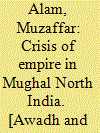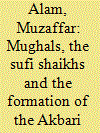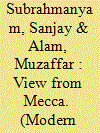|
|
|
Sort Order |
|
|
|
Items / Page
|
|
|
|
|
|
|
| Srl | Item |
| 1 |
ID:
046992


|
|
|
|
|
| Publication |
New Delhi, Oxford University Press, 1986.
|
| Description |
xv, 365p.pbk
|
| Standard Number |
0195630009
|
|
|
|
|
|
|
|
|
|
|
|
Copies: C:1/I:0,R:0,Q:0
Circulation
| Accession# | Call# | Current Location | Status | Policy | Location |
| 044576 | 954.025/ALA 044576 | Main | On Shelf | General | |
|
|
|
|
| 2 |
ID:
089360


|
|
|
|
|
| Publication |
2009.
|
| Summary/Abstract |
This essay places Mughal-Sufi relationship within a larger sixteenth century context, focusing on the strategies the early Mughals adopted to build their power in India. It reviews the positions of the two important sufi groups, the Indian Chishtis and the Central Asian Naqshbandis, juxtaposing the political benefits or the loss that the Mughals saw in their associations with them. While the Naqshbandi worldview and the legacy of the legendary Ubaid Allah Ahrar clashed with their vision of power, in the Chishti ideology, on the other hand, they found a strong support for themselves. The Chishtis then had an edge at the time of Akbar. But the Naqshbandis under Khwaja Baqi Billah (d. 1603) continued in their endeavour to reinstate their place in Mughal India. The paper thus provides a backdrop and makes a plea for re-evaluating the debate on the ideology and politics of Shaikh Ahmad Sirhindi (d. 1624).
|
|
|
|
|
|
|
|
|
|
|
|
|
|
|
|
| 3 |
ID:
152615


|
|
|
|
|
| Summary/Abstract |
This article examines the history of Gujarat-Red Sea relations in the first quarter of a century after the Ottoman conquest of the Hijaz, in the light of Arabic narrative sources that have hitherto been largely neglected. While earlier historians have made use of both Ottoman and Portuguese archives in this context, we return here to the chronicles of Mecca itself, which prove to be an unexpectedly interesting and rich source on the matter. Our main interest is in the figure of Jarullah ibn Fahd and his extensive annalistic work, Nayl al-munā. A good part of our analysis will focus on the events of the 1530s, and the dealings of Sultan Bahadur Shah Gujarati's delegation to the Ottomans, headed by ‘Abd al-‘Aziz Asaf Khan. But we shall also look at the longer history of contacts, and conclude with brief remarks on the relevance of the career of the celebrated Gujarati-Hijazi intellectual, Qutb al-Din Muhammad Nahrawali. We thus hope to add another important, concrete dimension to our understanding of India's location in the early modern Indian Ocean world, as a tribute to the career and contribution of David Washbrook, our friend and colleague.
|
|
|
|
|
|
|
|
|
|
|
|
|
|
|
|
|
|
|
|
|